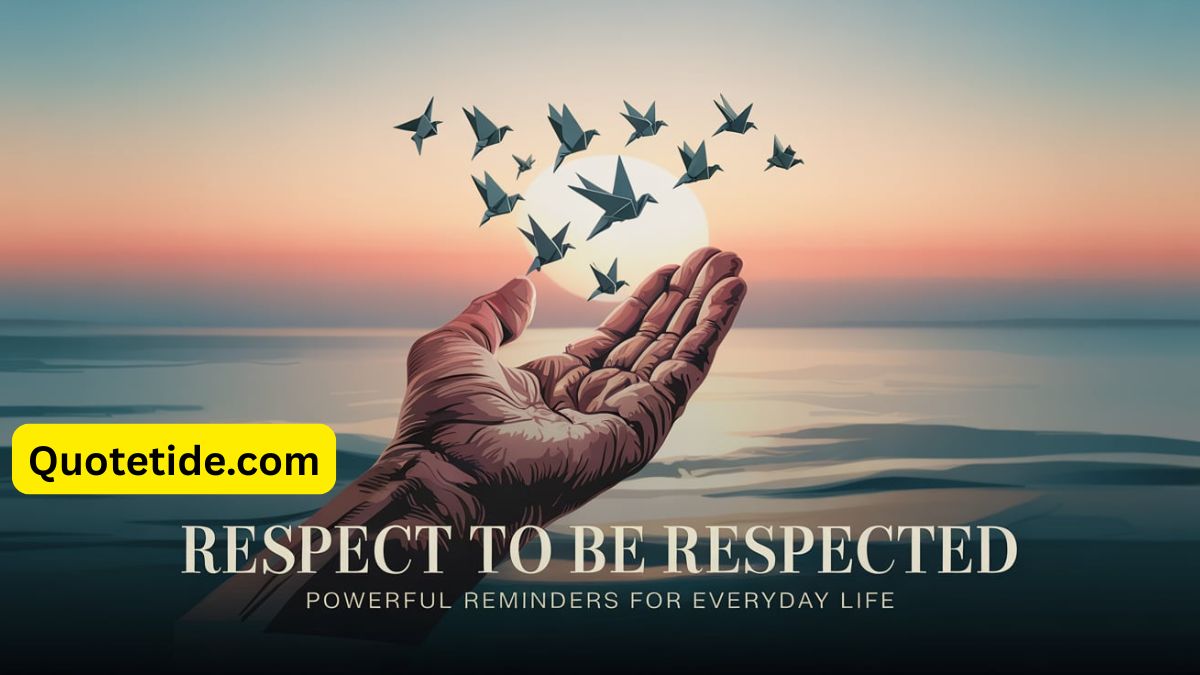“Respect to Be Respected: Powerful Reminders for Everyday Life” emphasizes that respect is not just a one-time gesture but a consistent practice that helps build lasting relationships. It’s a reminder that mutual respect is the foundation for any healthy interaction, whether in personal relationships or professional settings. To be respected quotes The more respect we give, the more we cultivate an environment where trust, understanding, and cooperation can thrive.
Respect isn’t just about receiving—it’s about creating a cycle where you earn respect through your actions, and others follow suit. It’s about being the change you wish to see in the world, starting with how you treat others in everyday situations. This principle isn’t just a moral idea; it’s the key to unlocking deeper connections and stronger bonds.
“Respect to Be Respected: Powerful Reminders for Everyday Life” teaches us that small acts of kindness, empathy, and active listening can transform the way we interact with others. It’s not only about receiving respect but also about nurturing it through our behavior, ensuring that we foster an environment where everyone feels valued and heard.
Respect as a Universal Human Need
At its core, respect satisfies a deep psychological need: the desire to feel valued, heard, and understood. Just like food or shelter, recognition and dignity are essential for emotional survival. When people feel respected, they thrive—emotionally, socially, and even physically.
- Abraham Maslow, a pioneer of human psychology, placed esteem needs—which include respect from others—on the fourth level of his Hierarchy of Needs.
- Disrespect, on the other hand, triggers defensiveness, resentment, and disconnection. Over time, it leads to emotional burnout, conflict, or alienation.
Promotes Social Harmony
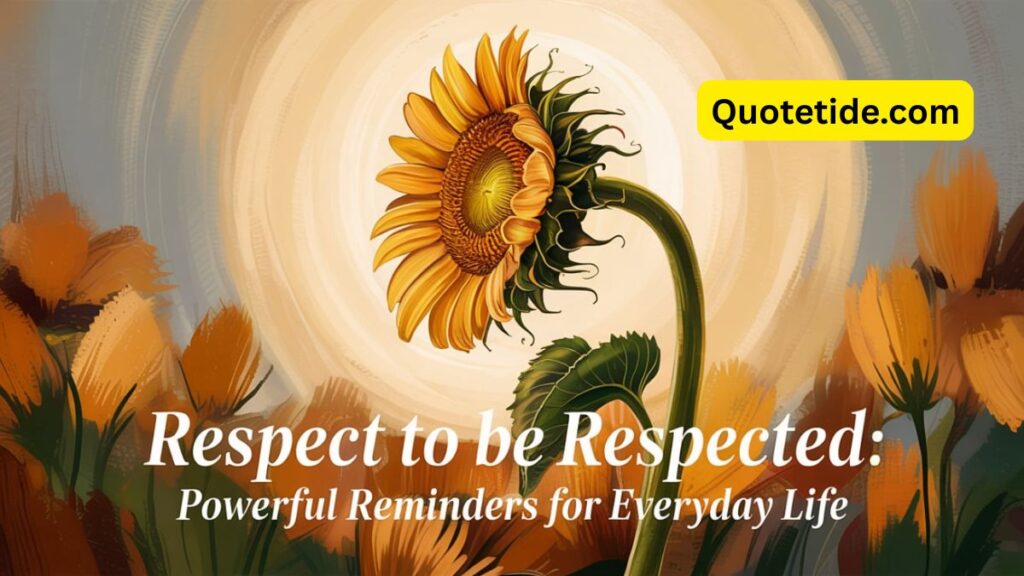
In today’s diverse and multicultural world, people come from all walks of life. We differ in values, beliefs, customs, and lifestyles. Respect creates common ground—a shared space where we can coexist, collaborate, and grow.
When we treat others with dignity, even when we disagree, we reduce hostility and promote peace. This is critical for:
- Schools, where mutual respect fosters safe, inclusive learning environments.
- Workplaces, where teams must function despite different communication styles or opinions.
- Families, where intergenerational and cultural divides can create tension.
Mutual respect, grounded in empathy and equal regard, helps us resolve conflicts without violence, listen without interrupting, and cooperate without dominating.
Respect Is the Key to Effective Communication
Let’s be real—communication without respect falls flat. You can’t build trust, collaborate, or negotiate with someone you don’t respect or who doesn’t respect you.
When you show respect, you:
- Listen actively, instead of waiting to speak.
- Use inclusive language that doesn’t demean or exclude.
- Acknowledge differing perspectives instead of dismissing them.
This doesn’t mean you have to agree with everyone. It means you treat their voice as valid, and their experience as real. This is what makes respectful disagreement possible.
Imagine how politics, social media, or even your last family dinner would be different if people led with respect. The difference is night and day.
Respect Strengthens Democracy and Civil Society
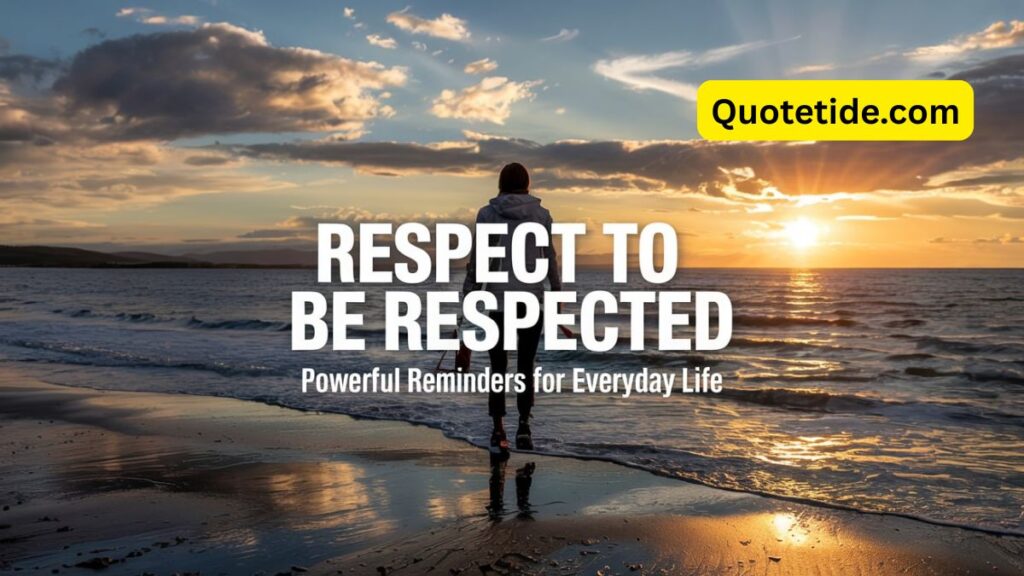
A free, democratic society relies on shared respect. We don’t have to like each other, or even agree on everything—but we need to recognize each other’s rights and humanity.
- When we respect diverse voices, we protect freedom of speech.
- When we respect the rule of law, we maintain fairness and accountability.
- When we respect institutions, we protect social order and collective progress.
Without dignity in relationships, democracy becomes dysfunctional. Civic respect helps bridge divides, making cooperation possible even among those who see the world differently.
Disrespect Is a Root Cause of Modern Problems
The erosion of respect has real-world consequences. Here are just a few examples of how a lack of respect fuels today’s challenges:
| Social Issue | How Disrespect Contributes |
|---|---|
| Workplace Toxicity | Disregarding boundaries, bullying, and dismissive behavior |
| Relationship Breakdown | Ignoring needs, invalidating emotions, constant criticism |
| Political Polarization | Demonizing opponents, refusing to engage in honest dialogue |
| Racial & Cultural Tensions | Failing to honor identities, histories, and lived experiences |
| Online Harassment | Dehumanizing language, anonymity-driven cruelty, cyberbullying |
In every case, the absence of respect weakens connection, creates enemies, and undermines shared goals.
Respect Fuels Personal and Professional Growth
Beyond social cohesion, respect plays a critical role in personal development. When you respect yourself, you:
- Set healthy boundaries.
- Make values-based decisions.
- Stand up for yourself without stepping on others.
And when you treat others with respect, you:
- Build stronger networks.
- Gain admiration and trust from peers.
- Lead more effectively, especially in diverse environments.
Leaders who cultivate respectful relationships earn loyalty, engagement, and innovation from their teams. In short, respect pays off—in human capital, productivity, and reputation.
The Emotional Power of Feeling Respected
Studies show that being treated with basic respect improves mental health, reduces stress, and even boosts immune function. That’s because being respected:
- Activates the brain’s reward centers, releasing dopamine.
- Helps reduce the stress hormone cortisol.
- Encourages more resilient, empathetic behavior in response.
Feeling disrespected, on the other hand, activates the same brain regions as physical pain. That’s why “a sharp word” or cold shoulder can hurt just as much as a punch.
Respect Can Bridge Generational and Cultural Gaps

Respect is a universal language—but how it’s expressed can vary by culture, age, or tradition.
In some cultures, respect is shown through formal titles or hierarchical deference. In others, it’s about equality and informality. Some elders might see direct eye contact as rude, while younger generations see it as confidence.
So how do we navigate this?
- Ask questions.
- Practice cultural humility.
- Observe and adapt with sensitivity.
What Does It Really Mean to ‘Respect to Be Respected’?
The phrase “respect to be respected” isn’t just a motivational quote—it’s a principle rooted in the heart of human interaction. At its core, it means that if you want others to treat you with dignity and honor, you must first extend that same dignity to them. It’s a two-way street, a dynamic exchange, and a reflection of your values in action.
But let’s go deeper. What does this really look like in your day-to-day life? How do you live out this principle in a world that sometimes feels anything but respectful?
It Starts With Self-Respect
You can’t demand respect from others if you’re not respecting yourself first. That means:
- Setting healthy boundaries and saying no when something doesn’t align with your values.
- Believing in your worth regardless of outside validation.
- Choosing relationships, jobs, and habits that reflect your inner dignity and personal standards.
When you respect yourself, others are more likely to follow your lead. It communicates, “I know my value—and I expect to be treated accordingly.”
🟩 Example:
If you’re constantly overextending yourself to please others, they may begin to take your time and energy for granted. But when you set boundaries and say, “I’m not available at that time,” you send a clear message: I matter too.
The Power of Reciprocity
Respect to be respected is not about hierarchy—it’s about reciprocal respect. It says: I will treat you with fairness, even if we disagree. I will give you the dignity I’d want for myself.
This principle applies in every setting:
- At work: Respect your coworkers’ time, opinions, and efforts, and you’ll often receive the same.
- In relationships: Respect your partner’s individuality and boundaries, and you’re more likely to build mutual trust and emotional safety.
- In public: Treating strangers with kindness and courtesy—like letting someone merge in traffic or holding the door—often inspires people to pass it on.
📊 Table: Everyday Examples of Reciprocity in Respect
| You Show Respect By… | You’re Likely to Receive… |
|---|---|
| Listening without interrupting | More attentive listening in return |
| Giving others credit for their ideas | Recognition and support for your own work |
| Being punctual and valuing others’ time | Respect for your schedule and commitments |
| Speaking kindly even during disagreement | Constructive, respectful dialogue |
| Being consistent in your behavior | Trust and predictability from others |
The Golden Rule in Action
You’ve probably heard this before: “Treat others the way you want to be treated.” This timeless guideline is the backbone of the “respect to be respected” philosophy.
But here’s the nuance—it doesn’t mean you always have to agree, comply, or give in. What it means is:
- You can challenge someone without belittling them.
- You can assert your needs without attacking theirs.
- You can disagree without being disrespectful.
🌱 Example:
Imagine a heated debate at work. You keep calm, explain your point, and listen actively when the other person speaks—even if you believe they’re wrong. That behavior earns you respect—not just from your opponent, but from everyone watching.
Respect Is Reflected, Not Demanded
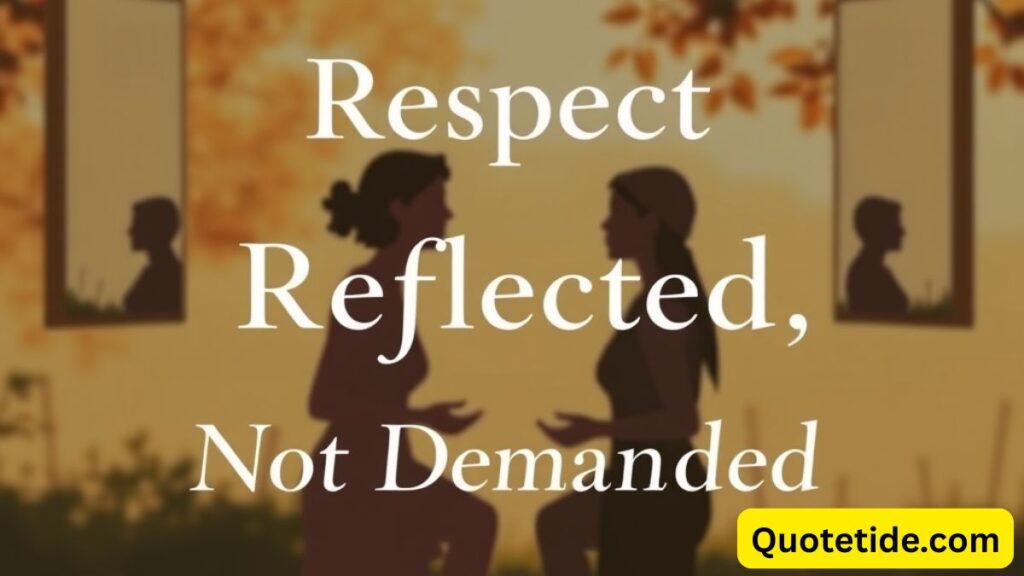
One of the most powerful aspects of this idea is that real respect can’t be forced—it’s earned. You can’t bully, shame, or manipulate someone into respecting you. You earn respect by showing character, consistency, and care.
🔑 Ways People Earn Respect:
- Leading by example, not command
- Keeping your word and honoring commitments
- Standing up for what’s right without tearing others down
- Admitting when you’re wrong
- Treating people equally—regardless of status or background
So when we say “respect to be respected,” what we’re really saying is: Don’t wait for others to treat you right—be the first one to show up with honor, and respect will often follow.
When Respect Isn’t Returned
Of course, there will be times when you show respect—and it’s not returned. So what then?
Two truths to hold:
- You’re not responsible for someone else’s behavior, only your own.
- Consistent disrespect is a red flag—and may mean you need to set firmer boundaries or even walk away.
⚠️ Important: Respecting others does not mean tolerating abuse, manipulation, or toxic dynamics. You can respect someone’s humanity while refusing to stay in situations that devalue you.
A Mirror and a Standar

Think of respect as both a mirror and a standard.
- As a mirror, it reflects back the kind of treatment you extend. If you consistently show respect, others are more likely to treat you similarly.
- As a standard, it sets the tone for how you allow yourself to be treated. When you hold firm to self-respect, you won’t settle for less from anyone.
Ultimately, to “respect to be respected” is a powerful, self-reinforcing mindset. It’s not just about being liked or praised—it’s about creating an atmosphere where everyone feels safe, valued, and free to be their authentic selves.
And in a world where division and disrespect often dominate the headlines, choosing respect—first and always—is a quiet revolution that changes everything.
Respect to Be Respected Quotes That Speak the Truth
Quotes have a unique power. They compress wisdom, experience, and deep truths into just a few words—easy to remember, hard to forget. When it comes to respect, there’s no shortage of powerful reminders that capture why it’s so essential. These respect to be respected quotes don’t just sound good—they hit home because they reflect real-life dynamics.
Below is a carefully curated list of quotes that speak directly to the idea that you must give respect to earn it. Alongside each quote, you’ll find a breakdown of what it really means, and how it applies to everyday life.
🔥 Classic Quotes That Capture the Core of Respect
“Respect is earned, not given.”
— Unknown
🟩 Why it hits: This one’s famous for a reason. You can’t demand respect—your actions, not your words, determine whether others view you with esteem.
“To gain respect, you must first give it.”
— Unknown
🟩 Key takeaway: Respect isn’t one-sided. It’s a reflection of how you treat others. Want to be valued? Start by valuing others.
“Treat people how you want to be treated.”
— The Golden Rule
🟩 Why it matters: This foundational life principle is about empathy and reciprocal respect. It’s simple but transformative.
✨ Quotes About Self-Respect and Inner Dignity

“Respect yourself and others will respect you.”
— Confucius
🟩 Deep truth: People take cues from how you carry yourself. If you walk with confidence, integrity, and self-worth, others take note.
“Respect yourself enough to walk away from anything that no longer serves you.”
— Unknown
🟩 Real talk: Self-respect often means saying no—even to people or habits you once tolerated. It’s about prioritizing your inner peace.
“The way you respect yourself is a reflection of how you expect to be treated.”
— Unknown
🟩 Why it matters: If you constantly downplay your needs or ignore your boundaries, others may do the same.
💬 Quotes That Speak to Respect in Relationships

“Respect is how to treat everyone, not just those you want to impress.”
— Richard Branson
🟩 Modern wisdom: Respect isn’t selective. It’s not reserved for bosses or influencers. True character is how you treat the waiter, janitor, or stranger you’ll never see again.
“The highest form of respect is to accept someone as they are.”
— Unknown
🟩 What it means: Acceptance doesn’t mean agreeing with everything. It means valuing their humanity, even in difference.
“True respect is being able to disagree without being disrespectful.”
— Unknown
🟩 Golden insight: You can stand your ground without crossing the line. Respectful disagreement is rare—and powerful.
“Without respect, relationships crumble.”
— Unknown
🟩 Why it’s true: You can’t build trust or love without respect. Once it’s gone, everything else starts to fall apart.
💡 Respect Quotes That Double as Life Lessons

“Give respect, and you’ll get it back in return.”
— Unknown
🟩 Core idea: Respect isn’t a gift—it’s a mirror. People often reflect the energy you give them.
“Respect isn’t something you can demand. It’s something you earn.”
— Unknown
🟩 Worth remembering: Titles don’t guarantee respect. It’s your character, not your position, that wins admiration.
“A lack of boundaries invites a lack of respect.”
— Cheryl Richardson
🟩 Hard truth: If you don’t stand firm on your limits, others might trample them. Respect starts with clear boundaries.
“Treat others with respect, even if they don’t deserve it—not because of who they are, but because of who you are.”
— Dave Willis
🟩 Character insight: Your actions reflect your values, not theirs. Choosing respect, even when it’s hard, speaks volumes.
🧠 Respect and Power: Quotes on Humility and Integrity

“Respect is not about position or power, but about kindness and humility.”
— Unknown
🟩 Real leadership: The most powerful people lead with grace, not ego. Respect isn’t enforced—it’s inspired.
“Respect isn’t about control. It’s about mutual understanding.”
— Unknown
🟩 What it teaches: If you’re trying to dominate, you’re not respecting. Respect is built through communication and empathy.
“The way you respect others is a reflection of how you respect yourself.”
— Unknown
🟩 Full-circle moment: If you’re bitter, critical, or dismissive of others, ask—are you doing the same to yourself?
📝 Inspirational Respect Quotes to Live By
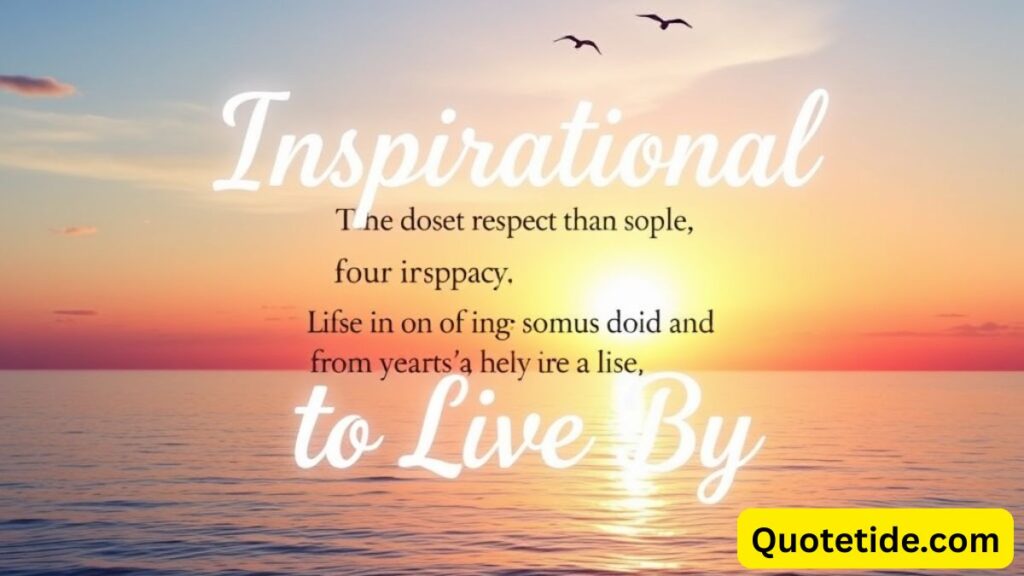
“Respect means accepting people for who they are—even when they’re different from you.”
— Unknown
🟩 Powerful in diversity: In today’s polarized world, this one hits hard. Acceptance is the bedrock of unity.
“Respect comes in many forms, but it always starts with kindness.”
— Unknown
🟩 Practical application: A kind word, a listening ear, or a simple “thank you” can shift an entire dynamic.
“Give honor where honor is due.”
— The Bible (Romans 13:7)
🟩 Spiritual respect: Whether religious or not, the message rings true—recognize and elevate the good in others.
“Real respect means treating others with dignity, regardless of their status.”
— Unknown
🟩 Why it matters: Everyone has value. Whether they wear a suit or a uniform, they deserve to be seen and heard.
📚 Summary Table: Respect Quotes by Theme
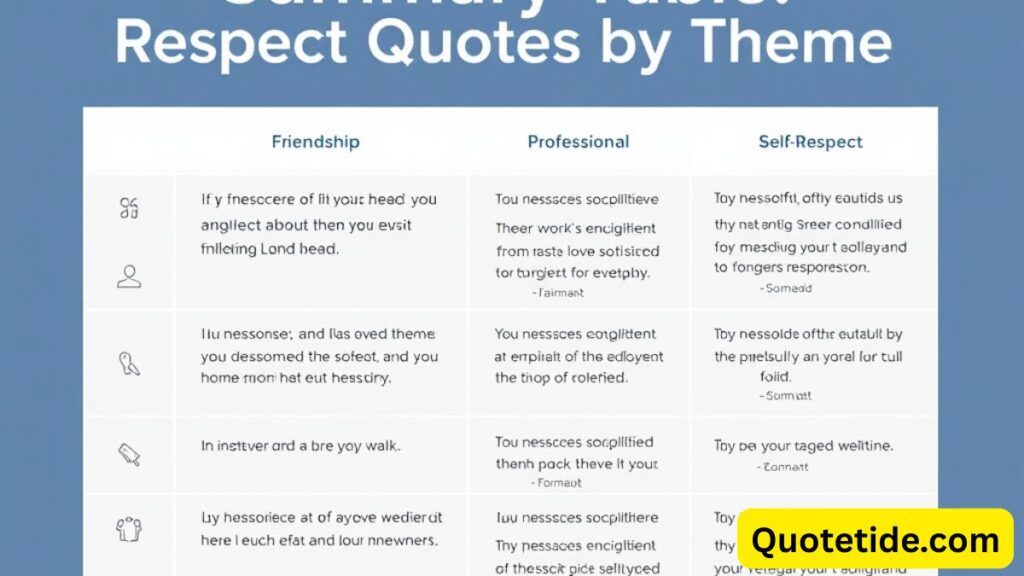
| Theme | Quote Example |
|---|---|
| Self-Respect | “Respect yourself and others will respect you.” – Confucius |
| Mutual Respect | “To gain respect, you must first give it.” – Unknown |
| Disagreement | “True respect is being able to disagree without being disrespectful.” – Unknown |
| Boundaries | “A lack of boundaries invites a lack of respect.” – Cheryl Richardson |
| Universal Dignity | “Respect is how to treat everyone, not just those you want to impress.” |
💬 Use These Quotes Daily
You can:
- Write one on your mirror to remind yourself to lead with dignity.
- Share them in meetings or emails to elevate the tone.
- Post on social media to inspire others and model respectful behavior.
🧠 Respect isn’t just taught—it’s modeled. When you live out these quotes, you become the kind of person who doesn’t just get respect—you inspire it.
Real-Life Applications: How to Practice Respect Daily
Reading about respect is one thing. Living it out—especially when you’re frustrated, tired, or dealing with difficult people—is another story. But the real impact of respect shows up in everyday behavior. From how you treat others in passing to the tone you use during a disagreement, respect is reflected in your daily choices.
This section is all about practical, real-life ways to demonstrate respect—at home, at work, online, and in your community. Because if you’re not putting it into action, respect is just a nice idea.
💡 Why Practicing Respect Daily Matters
Respect isn’t something you “turn on” for special occasions or only show to people you like. It’s a daily commitment. Think of it as a muscle—the more you use it, the stronger it gets.
Showing respect regularly:
- Builds emotional intelligence
- Fosters mutual respect
- Helps resolve conflict more peacefully
- Earns trust and admiration
- Improves self-respect by aligning with your values
It’s not about being perfect—it’s about being intentional.
🏠 At Home: Respect Begins in Familiar Spaces

Home is where we often let our guard down. That’s why it’s one of the most important places to practice respect—especially with the people closest to you.
✅ Ways to Show Respect at Home
- Listen fully when your partner or child speaks—no phones, no interruptions.
- Respect personal space and privacy—knock before entering closed rooms.
- Avoid sarcasm or passive aggression—address concerns directly.
- Share chores and responsibilities—treat your time as equally valuable.
- Honor family traditions or preferences, even when they differ from yours.
🟩 “Respect begins with listening.” – Unknown
Why it works: Home is where core values are reinforced. Kids, especially, learn what respect looks like by watching adults.
👥 At Work: Respect Builds Professional Credibility
In the workplace, respect leads to stronger collaboration, better communication, and higher productivity. Whether you’re a leader or a team member, how you treat people can either build trust or quietly erode it.
✅ How to Show Respect at Work
- Acknowledge others’ contributions—give credit publicly.
- Speak professionally, even when you’re under pressure.
- Honor time boundaries—show up on time, end meetings when scheduled.
- Don’t interrupt in meetings—wait your turn, and make space for quieter voices.
- Respect cultural and personal differences—avoid jokes or language that alienate.
🧠 Pro Tip: Leaders who consistently treat people with honor and dignity inspire loyalty, not fear.
🟩 “Respect is not about position or power, but about kindness and humility.”
💻 Online: Respect in the Digital Age

The internet often feels like a place where respect goes to die—but it doesn’t have to be. In fact, respectful digital behavior is more important than ever. Your online presence leaves a digital legacy.
✅ Digital Respect in Action
- Pause before commenting—ask: Would I say this face-to-face?
- Don’t troll or engage in name-calling, even when provoked.
- Credit original creators when reposting content or sharing quotes.
- Respond thoughtfully in emails and DMs, even when declining something.
- Be inclusive with language—avoid assumptions about gender, race, or beliefs.
📊 Fact: According to a Pew Research Study, over 40% of internet users have personally experienced harassment online. A little digital courtesy goes a long way.
🧍♂️In Public: Small Acts, Big Impact
Public spaces test your ability to show respect to strangers—people you don’t know, may never meet again, and have no obligation to. But that’s where real character shines.
✅ Everyday Public Acts of Respect
- Hold the door for the person behind you.
- Let someone merge in traffic without making it a power struggle.
- Say “please” and “thank you” to service workers.
- Clean up after yourself in shared spaces.
- Don’t play loud music or have speakerphone calls in public places.
🟩 “Respect is how to treat everyone, not just those you want to impress.” – Richard Branson
These small behaviors reflect who you are, not just how you react in big moments.
🧠 Internal Respect: The Way You Talk to Yourself
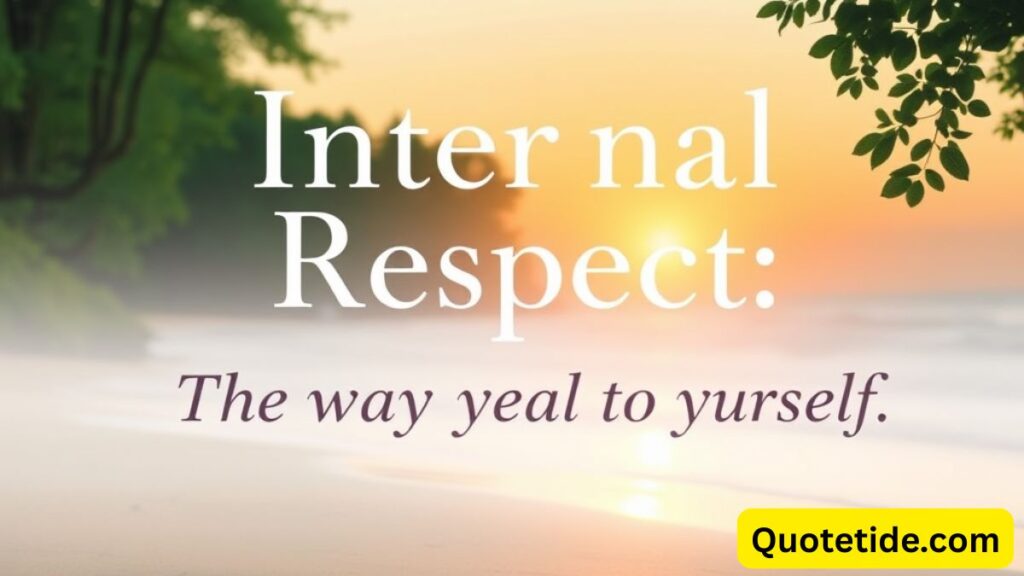
Self-respect isn’t just a mindset—it’s a practice. It affects your confidence, your relationships, and how much respect you attract from others.
✅ How to Practice Self-Respect Daily
- Speak kindly to yourself—replace self-criticism with encouragement.
- Honor your needs—don’t ignore hunger, fatigue, or emotional overwhelm.
- Stay aligned with your values, even when it’s inconvenient.
- Say no without guilt when something doesn’t serve you.
- Celebrate small wins, not just big achievements.
📘 Case Study: In therapy and coaching, one of the most consistent themes among people struggling with boundaries or burnout is a lack of self-respect. Building this inner dignity often unlocks healthier relationships and decisions.
🧭 Respect in Conflict: The Real Test of Character

It’s easy to be respectful when everyone agrees. The real challenge is when you’re angry, hurt, or feel misunderstood.
✅ How to Stay Respectful in Conflict
- Use “I” statements instead of accusations: “I feel” vs. “You always…”
- Don’t interrupt or raise your voice—breathe before reacting.
- Separate behavior from identity—attack the issue, not the person.
- Acknowledge the other person’s feelings, even if you disagree.
- Know when to pause—sometimes space is the most respectful move.
🧠 Behavioral Insight: Respect in conflict doesn’t mean being passive—it means being firm and fair, not forceful or cruel.
📋 Respect Checklist: Are You Walking the Talk?
Use this quick checklist to assess how well you’re practicing respect in daily life.
| Area | Yes | No |
|---|---|---|
| I listen without interrupting | ✅ | ❌ |
| I express my views kindly, even when I disagree | ✅ | ❌ |
| I treat everyone—regardless of job or status—with equal dignity | ✅ | ❌ |
| I set boundaries and honor my own needs | ✅ | ❌ |
| I speak positively about others, even when they’re not around | ✅ | ❌ |
| I give credit where it’s due | ✅ | ❌ |
| I hold myself to the same standards I expect from others | ✅ | ❌ |
💬 “People may forget what you said, but they’ll never forget how you made them feel.”
— Maya Angelou
Respect Is a Daily Choice
Respect isn’t a grand gesture—it’s built through hundreds of small, consistent actions. Every time you choose empathy over judgment, kindness over criticism, or patience over irritation, you’re contributing to a more respectful world.
Start small. Look someone in the eye. Say thank you. Set a boundary. Apologize when necessary. It’s these moments that teach others how to treat you—and how to treat each other.
Stories That Prove Respect Changes Everything
Sometimes, the best way to understand the true power of respect is through the lens of real stories. These aren’t just feel-good anecdotes—they’re moments where mutual respect, self-respect, or the simple choice to treat others with dignity led to dramatic shifts in outcomes, relationships, and lives.
Let’s explore a few true and powerful examples—across workplaces, schools, communities, and families—that prove why giving respect is one of the most transformational things you can do.
🏢 Workplace Story: The Manager Who Listened First
📍 Setting: A busy tech startup in Austin, TX
🎯 The Issue: A top-performing developer suddenly stopped contributing in team meetings. The manager noticed but didn’t confront—yet the silence hurt the team’s momentum.
Rather than assuming laziness or disengagement, the manager set up a one-on-one and simply asked how the developer was doing. No accusations. No judgment. Just curiosity and respectful space to be heard.
It turned out the developer felt their ideas were constantly overridden by a louder, more senior colleague. They had decided it wasn’t worth speaking up.
➡️ What Changed:
The manager publicly acknowledged the developer’s contributions in the next meeting and implemented a new round-robin style for discussions, ensuring everyone had time to speak.
💡 Impact:
- The developer re-engaged immediately.
- The team began collaborating more creatively.
- The toxic dynamic resolved without conflict—because of one respectful conversation.
🟩 “When people feel heard, they feel respected. And when they feel respected, they engage.”
🎓 School Story: A Teacher Who Respected a Troublemaker

📍 Setting: A high school classroom in Detroit
🎯 The Issue: A student labeled “disruptive” had been kicked out of two previous classes and was on the verge of expulsion.
Instead of focusing on punishment, a new teacher asked the student to help lead a discussion on a book he was passionate about. The student was shocked—no one had ever asked for his input before. She showed reciprocal respect in the place of discipline.
➡️ What Changed:
The student not only led the discussion with insight, but other students started seeing him differently. He earned their respect—not through obedience, but through shared value.
💡 Impact:
- His classroom behavior improved dramatically.
- He ended the year with honors.
- He later credited that teacher with “being the first person to treat me like I mattered.”
🟩 “Respect changes identity. When someone sees the best in you, you start seeing it in yourself.”
👨👩👧👦 Family Story: A Boundary That Saved a Relationship

📍 Setting: A multigenerational home in Chicago
🎯 The Issue: A daughter in her 30s had moved back home temporarily but found her parents constantly commenting on her life decisions. She felt like a teenager again, and resentment grew.
Instead of snapping or withdrawing, she sat them down and calmly said:
“I love and respect you, but I need emotional boundaries if we’re going to live peacefully together. Can we talk about what that looks like?”
It wasn’t easy, but because she approached them with self-respect and kindness, they were more open to adjusting.
➡️ What Changed:
Together, they set clear boundaries around space, schedules, and feedback. The respect became mutual again.
💡 Impact:
- Less tension.
- Deeper conversations.
- More laughter, fewer arguments.
🟩 “Respecting yourself enough to speak up can rescue a bond on the edge of breaking.”
🌍 Community Story: A Neighborhood Restored Through Mutual Respect
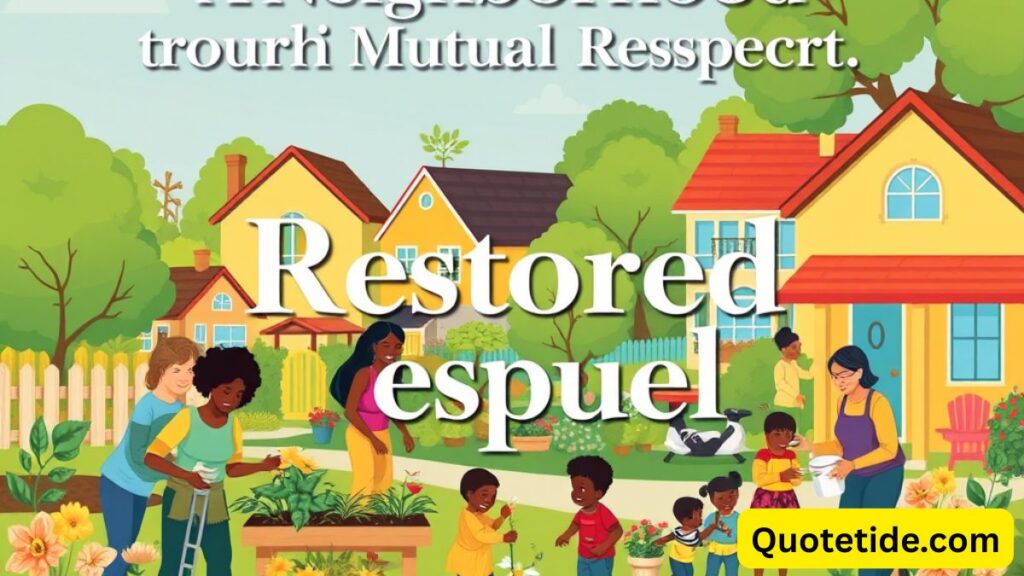
📍 Setting: A racially diverse neighborhood in Oakland, CA
🎯 The Issue: Long-standing tension between two community groups over park usage and noise led to years of distrust and anonymous complaints.
A local leader stepped in—not to enforce rules, but to host a series of dialogues. She made sure every voice was heard, no matter the background. Everyone was asked to share not just complaints, but hopes.
Through respectful dialogue and equal regard, people began to realize they wanted the same things—safe play areas, clean spaces, and a sense of community.
➡️ What Changed:
Volunteers from both sides started organizing joint events and cleanup days. Respect turned strangers into allies.
💡 Impact:
- Crime dropped by 15%.
- Two former “rival” community members now co-run the local youth sports program.
- Local media picked up the story as a model for neighborhood reconciliation.
🟩 “Respect is the foundation of peace. Without it, we divide. With it, we build.”
👔 Leadership Story: How One CEO Rebuilt a Broken Culture

📍 Setting: A mid-size marketing agency in NYC
🎯 The Issue: High turnover, low morale, and distrust in leadership. Employees felt like cogs in a machine.
When a new CEO took over, she didn’t issue new rules. Instead, she did something radical: She sat down and listened. She met with every team individually and asked two questions:
- “What do you love about working here?”
- “What makes it hard to stay?”
Then she followed up with action—creating flexible schedules, flattening hierarchies, and building respectful relationships across departments.
➡️ What Changed:
- Turnover dropped by 40%.
- The company made “Top Places to Work” in under two years.
- Productivity soared—because people felt seen, heard, and valued.
🟩 “When leaders choose humility and respect, culture changes from the inside out.”
📚 Moral of These Stories: Respect Isn’t Just Nice—It’s Powerful
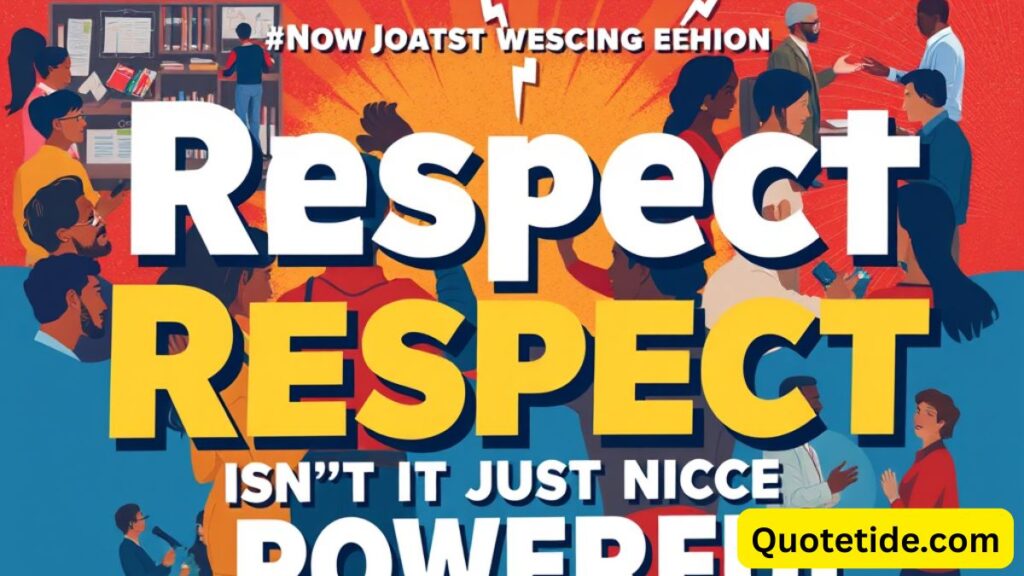
Each of these real-life moments has one thing in common:
Someone chose respect—when they didn’t have to. And that choice changed the dynamic completely.
Whether it was:
- a teacher empowering a student,
- a leader reshaping a company culture,
- a family choosing healthy boundaries, or
- neighbors finding common ground…
The outcome wasn’t just better behavior—it was transformation.
🔁 Everyday Takeaways from These Stories
| Key Behavior | Respect Principle in Action |
|---|---|
| Listening without judging | Builds mutual respect and trust |
| Asking instead of assuming | Shows you value others’ perspectives |
| Setting clear boundaries | Communicates self-respect |
| Admitting you don’t have all answers | Displays humility and earns admiration |
| Treating everyone with dignity | Encourages positive relationships and equity |
Common Misconceptions About Respect
Respect is one of those concepts that sounds simple on the surface but is often misunderstood. We all know that it’s important to treat others with respect, but what does respect really mean? How is it demonstrated in daily life? And what are some of the myths that cloud our understanding of respect?
Let’s take a closer look at some common misconceptions about respect, and why clearing up these misunderstandings is crucial for building better relationships and a more harmonious society.
Misconception 1: Respect Must Be Earned

One of the most widely held beliefs is that respect must be earned, implying that it’s something people can only receive if they meet certain criteria or prove themselves worthy.
While it’s true that earned respect (through actions, trust, and integrity) is important, basic respect is a fundamental human right. It’s the respect for one’s dignity, worth, and rights as a person that doesn’t depend on achievement or behavior.
Respecting others as a basic principle means recognizing their humanity and equality, no matter their status, race, gender, or past actions. Self-respect, similarly, is not contingent on being perfect but on recognizing your own value as a person.
Why It’s Wrong:
- Everyone deserves basic respect simply by being human.
- We can give respect freely even when someone has made mistakes, as long as they’re working toward growth.
- If respect were only earned, it would create a society of barriers rather than one built on mutual understanding.
Misconception 2: Respect Equals Agreement
Many people assume that in order to respect someone, they must agree with everything that person says or does. This is not the case. Respect does not mean agreement.
In fact, the highest form of respect often involves the ability to disagree without disrespect. Healthy relationships and respectful communication thrive when individuals can express differing opinions while still showing consideration for the other person’s views.
Why It’s Wrong:
- Disagreement is a natural part of human interaction. Showing respect means acknowledging the other person’s right to their perspective, even if you don’t share it.
- True mutual respect allows room for differences and creates opportunities for constructive dialogue and growth.
Misconception 3: Respect is a One-Way Street
Respect is often thought of as something that one party gives while the other party receives. However, respect is inherently reciprocal. Mutual respect is foundational to healthy relationships, whether they’re personal or professional.
If you treat others with respect, they are more likely to treat you the same way. But if you only give respect when you receive it first, you miss out on the chance to lead by example and create a culture of respect.
Why It’s Wrong:
- Respecting others should not be dependent on whether you get it back immediately. Consistency is key.
- Showing respect without expectation creates a positive environment where people are more likely to follow suit.
Misconception 4: Respect Is Only About Words
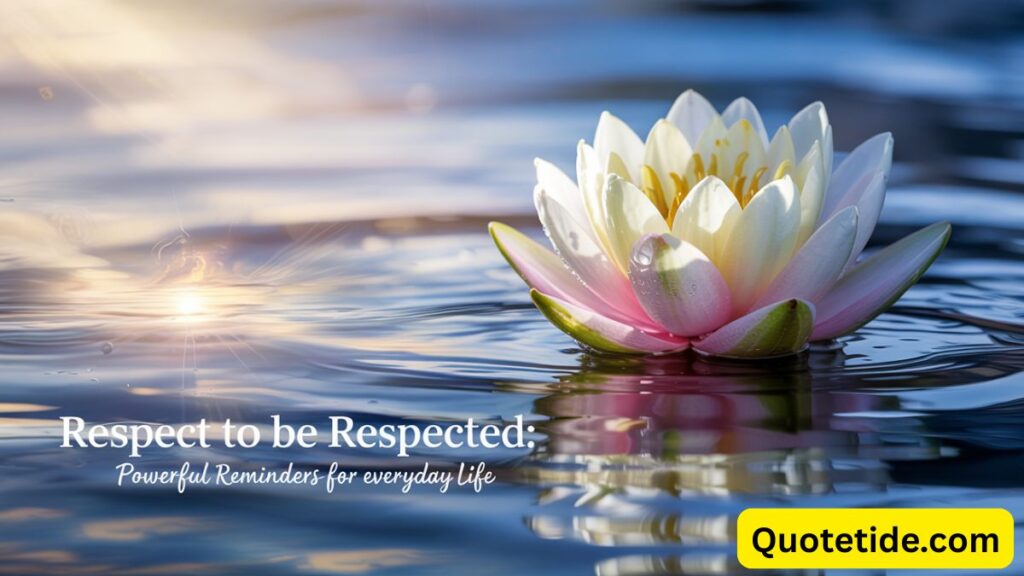
It’s easy to think that respect is only about saying the right things—being polite, using kind language, or avoiding rude comments. However, respect is not just about words. It’s a combination of actions, body language, and tone that show you value others.
For instance, you can say all the right things but still undermine the other person through dismissive body language or inattentive listening. On the flip side, you can show deep respect without uttering a word—through simple actions like making eye contact, listening attentively, or offering help without expecting something in return.
Why It’s Wrong:
- Words alone don’t define respect; actions speak louder. A person can say “I respect you” while still undermining the other person’s value through their actions.
- Respectful actions—like showing kindness, providing space, or being dependable—communicate more effectively than mere politeness.
Misconception 5: Respect Only Applies to Authority Figures
Many people think that respect should only be shown to those in positions of power, like bosses, teachers, or parents. While it’s important to treat authority figures with respect, true respect should extend to everyone, regardless of their status.
Respecting co-workers, peers, and even strangers fosters equality and fairness. Treating others with kindness and valuing their opinions should be a core part of how we engage with everyone, not just those who hold higher positions.
Why It’s Wrong:
- Respect is universal. Everyone, regardless of their role or status, deserves to be treated with dignity and regard.
- Leadership and authority aren’t the only places where respect can make an impact. Respect in peer relationships is just as important for building trust and understanding.
Misconception 6: Respect Means Never Setting Boundaries

Another misconception is that respect requires you to accept everything from others, even if it hurts or invades your personal space. However, true respect includes healthy boundaries.
Respecting yourself and others often means saying no when something crosses your personal limits or values. Setting boundaries doesn’t mean disrespecting someone; it simply means that you value your own emotional and physical well-being.
Why It’s Wrong:
- Healthy boundaries are a form of respect for yourself and others. They show that you value your time, energy, and limits, and that you are not willing to sacrifice your personal comfort for others.
- In fact, when you set clear boundaries, you earn respect from others who will appreciate your honesty and self-awareness.
Misconception 7: Respect Is About Compliance
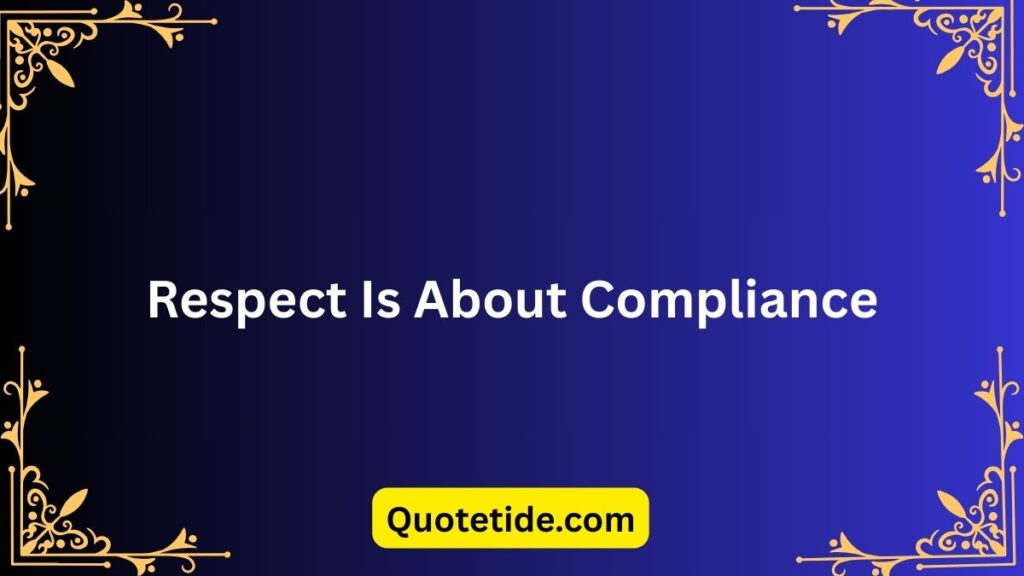
Some people assume that in order to respect someone, you must comply with their wishes or follow their directions without question. This is a misunderstanding of respect.
Respect involves the willingness to engage with others thoughtfully, but it does not require blind compliance. You can respect someone and still express a differing opinion, challenge their ideas, or take a stand for what you believe is right.
Why It’s Wrong:
- Respect is not obedience. It’s about valuing others’ opinions while still maintaining your autonomy and asserting your needs.
- True respect enables healthy discussions and debates, where everyone feels heard, not just compliant.
Misconception 8: Respect Is Only Important in Close Relationships
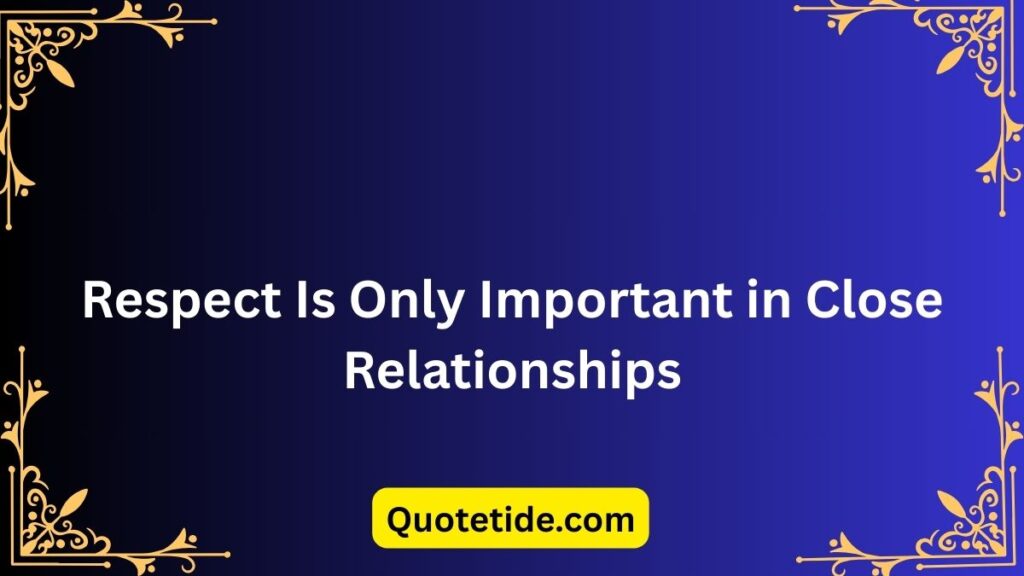
Some people might think that respect is something that only matters in close relationships, like family or close friends. In reality, respect is just as important in more distant or casual relationships, such as those with colleagues, acquaintances, or even strangers.
Respecting people in every interaction creates a more harmonious environment, fosters trust, and reduces conflict. Whether it’s a brief encounter at the grocery store or a business meeting, respect is always relevant.
Why It’s Wrong:
- Respect doesn’t diminish based on the level of familiarity with the person. It’s a key ingredient in every interaction, from professional exchanges to casual encounters.
- Showing respect to even casual acquaintances can lead to more meaningful connections and a positive reputation.
Clearing the Confusion About Respect

There’s a lot of confusion surrounding the concept of respect, but once we clear up these misconceptions, we can better understand its true nature. Respect is not about power, compliance, or only being extended to authority figures. Instead, it’s a fundamental human value that should be shared across all relationships, regardless of status or agreement.
Respect is about treating others with dignity, valuing their opinions, and setting boundaries when necessary. It’s about active listening, acting with kindness, and creating mutual understanding. When we recognize these truths, we can build better, more authentic connections, and foster environments of trust, empathy, and collaboration.
Respect and Personal Growth: Why It’s a Two-Way Street
In today’s fast-paced world, personal growth is something we all strive for—whether it’s becoming a better version of ourselves, improving our relationships, or advancing in our careers. However, personal growth doesn’t occur in isolation. It’s a result of our interactions with others, our environment, and the respect we both give and receive. Respect is not just a nice-to-have quality; it’s a critical element in the process of self-improvement and personal development.
Respect is a two-way street. It isn’t just about how you treat others, but also about how you allow others to treat you. When you respect others, you open the door to learning, connection, and growth. Likewise, when you are treated with respect, you gain confidence, trust, and the encouragement needed to continue improving. Respect plays a key role in both personal development and in building healthy relationships, which are essential for your success and well-being.
Let’s dive deeper into why respect is a crucial part of personal growth, and how it can shape the trajectory of your journey toward becoming the best version of yourself.
Understanding Respect in the Context of Personal Growth
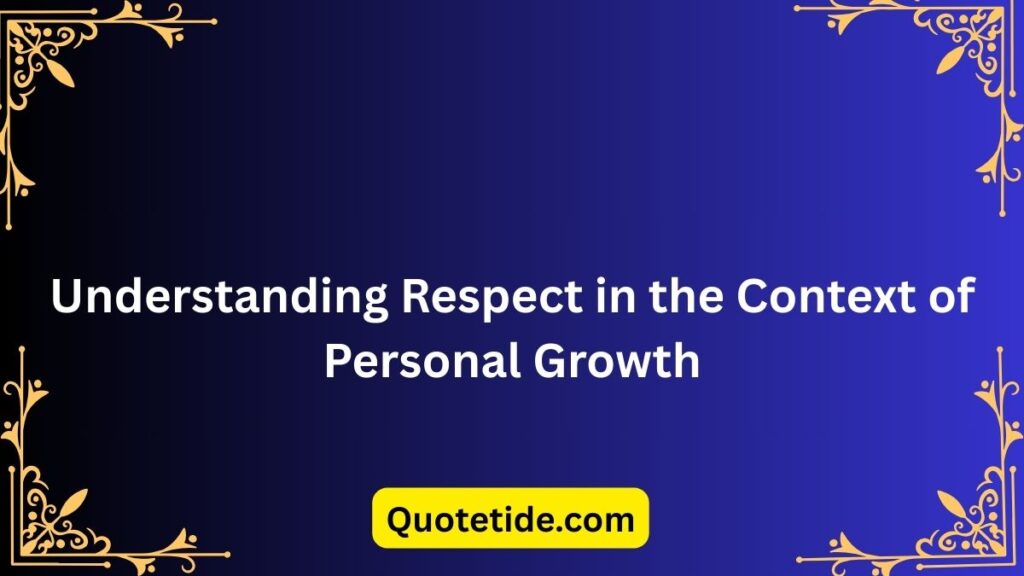
At its core, respect is about recognizing the inherent value in yourself and others. It’s a mindset that acknowledges dignity, equality, and kindness. When we respect others, we see them as equals, deserving of empathy, consideration, and fairness. Similarly, when we respect ourselves, we recognize our own worth and set boundaries that protect our well-being.
However, respect is more than just a passive understanding. It’s an active choice and a practice that influences every aspect of our lives, from our internal self-worth to our interactions with others. In the context of personal growth, respect impacts how we develop in the following ways:
- Self-Respect: Before you can grow and change, you must first have respect for yourself. This means valuing your worth, setting boundaries, and recognizing your personal needs and desires. Without self-respect, it’s hard to progress, because you may allow others to walk all over you or fail to prioritize your own well-being.
- Respecting Others: Growth is a collaborative journey. Respecting others involves treating them with dignity, listening to their perspectives, and recognizing their unique qualities and experiences. Through respectful interactions, you learn valuable lessons, challenge your assumptions, and build meaningful relationships that support your growth.
- Mutual Respect: Personal growth thrives in environments where mutual respect is present. When you respect others and they respect you, there is a reciprocal exchange that fosters learning, empathy, and cooperation. Mutual respect in relationships leads to open communication and trust, which are critical to personal development.
Why Respect Is Essential for Personal Growth
Respect serves as the foundation for personal growth in several key ways:
1. Boosts Self-Esteem and Confidence
When you show respect for yourself, you develop a strong sense of self-worth. This is fundamental to personal growth because confidence fuels self-improvement. If you value yourself, you’re more likely to:
- Set goals that are meaningful and aligned with your values.
- Take risks and step out of your comfort zone to try new things.
- Own your decisions, learning from mistakes and successes alike.
On the flip side, when others show respect towards you, it reinforces your self-esteem. Being treated with kindness, consideration, and recognition makes you feel valued, which boosts your confidence and motivates you to continue improving.
2. Fosters Healthy Relationships
Respect is the cornerstone of any healthy relationship, whether it’s romantic, professional, or platonic. When respect is present, trust and communication flow naturally, creating a safe space for both parties to grow. Healthy relationships offer:
- Emotional support: Respectful relationships provide the encouragement needed to overcome obstacles and face challenges with resilience.
- Constructive feedback: In respectful interactions, you’re more likely to receive feedback that helps you grow—without it feeling judgmental or critical.
- Mutual learning: Respect allows both people to share ideas, experiences, and knowledge, fostering growth and understanding on both sides.
Healthy, respectful relationships not only nurture your personal development but also expand your network, opening doors to new opportunities.
3. Creates a Positive Environment for Change
Your environment plays a huge role in your ability to grow. A respectful environment—where everyone treats each other with dignity and consideration—creates the right conditions for personal transformation. In such an environment, you are more likely to:
- Feel safe to express yourself, your ideas, and your dreams without fear of judgment.
- Be motivated to pursue your goals because the respect you receive fosters a sense of belonging and purpose.
- Have the space to make mistakes and learn from them, knowing that failure isn’t met with ridicule but with understanding and support.
Conversely, an environment devoid of respect—whether it’s toxic work cultures, unsupportive friendships, or disrespectful social circles—can stifle growth, making it harder for you to reach your potential.
4. Encourages Emotional Intelligence and Self-Awareness
Respect requires an understanding of others’ emotions and boundaries. This empathy is a key component of emotional intelligence (EQ), which is essential for personal growth. As you engage with others respectfully, you develop:
- Empathy: The ability to understand and share the feelings of others enhances your connection with them and helps you grow emotionally.
- Self-awareness: Respecting your own boundaries and values allows you to develop a deeper understanding of who you are and what you need to thrive.
- Conflict resolution: Respect helps you navigate disagreements with grace, ensuring that your emotions don’t lead to destructive behavior or communication breakdowns.
The more emotionally intelligent you become, the more effectively you can handle challenges and interpersonal relationships, which accelerates your personal growth.
5. Encourages Authenticity
To grow as a person, you must be authentic—true to yourself, your values, and your goals. Respect for yourself and others creates a space where authenticity is not only encouraged but celebrated. When you feel respected, you’re more likely to:
- Express your true thoughts and feelings, which enables you to connect with others on a deeper level.
- Honor your values and align your actions with what matters most to you.
- Feel comfortable in your own skin, knowing that your worth isn’t based on others’ approval but on your own beliefs and actions.
Being authentic is essential for personal growth because it allows you to learn from your experiences without the pressure of conforming to societal expectations.
How to Cultivate Respect for Personal Growth
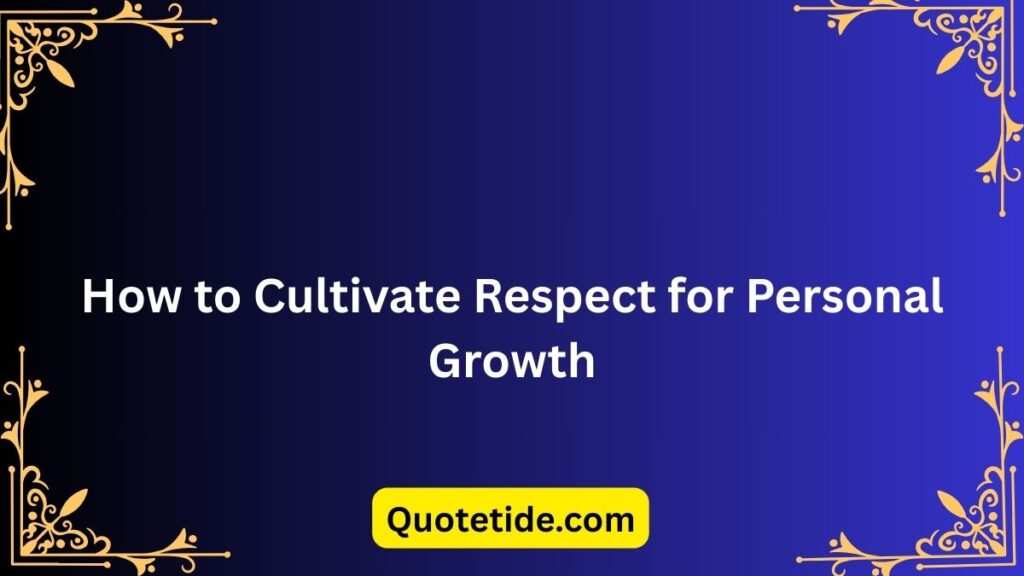
Now that we understand the role respect plays in personal growth, how can we cultivate it in our daily lives? Here are some practical ways to practice respect that will nurture your personal development:
1. Develop Self-Respect
- Set Boundaries: Identify what you will and won’t tolerate. Setting clear boundaries is an essential part of maintaining self-respect.
- Prioritize Your Needs: Recognize your emotional, mental, and physical needs, and make time for them in your daily life.
- Practice Self-Care: Take time to nurture your body, mind, and spirit. Whether it’s through exercise, meditation, or hobbies, practicing self-care helps you maintain a healthy sense of self-respect.
2. Show Respect for Others
- Listen Actively: When you listen to others, you show them respect and create a space where they feel heard and valued.
- Show Appreciation: Acknowledge others’ efforts and contributions, even the small things. Simple words like “thank you” or “I appreciate that” can go a long way.
- Be Empathetic: Try to see the world from other people’s perspectives. This helps you build stronger, more meaningful relationships and deepens your personal growth.
3. Create a Respectful Environment
Promote Open Dialogue: Create a culture where everyone feels comfortable sharing their opinions and ideas without fear of judgment.
Surround Yourself with Positive People: Engage with those who respect you and challenge you to grow. Positive relationships create a growth-oriented atmosphere.
Encourage Respect in Others: Lead by example. When you show respect, you inspire others to do the same.
Quotes Turned Into Daily Affirmations or Reminders

Quotes have the power to inspire, motivate, and remind us of important life lessons. They act as moments of clarity that can help refocus our mindset and reframe our thinking. By turning some of the most powerful quotes about respect, self-worth, and personal growth into daily affirmations or reminders, we can integrate these wise words into our routines, giving us strength, perspective, and a reminder to stay grounded.
Let’s explore how some of the most profound respect-related quotes can be transformed into impactful daily affirmations that align with your goals, values, and mindset.
1. “Respect is earned, not given.” – Unknown
Affirmation:
“I earn respect through my actions, integrity, and kindness. I choose to be authentic, which naturally attracts the respect of others.”
This quote serves as a powerful reminder that respect isn’t something automatically granted—it’s built through our behavior. It helps us focus on taking purposeful actions that lead to respect, rather than waiting for it to come to us. With this affirmation, you’re reminded that respect is something you actively cultivate through honesty, empathy, and consistency.
2. “Treat people how you want to be treated.” – The Golden Rule
Affirmation:
“I treat others with kindness, empathy, and fairness because I understand that how I treat others reflects who I am.”
This classic quote offers timeless wisdom. Turning it into an affirmation helps ground you in the importance of mutual respect and kindness. By internalizing this message, you’re reminded daily to approach every interaction with consideration, knowing that the energy you put out into the world will come back to you.
3. “To gain respect, you must first give it.” – Unknown
Affirmation:
“I give respect freely, knowing that it will come back to me in powerful and meaningful ways. My actions are grounded in kindness and humility.”
This reminder helps you acknowledge that respect is a reciprocal experience. You can’t expect to receive it if you don’t offer it. By affirming this, you’re committing to treat others with dignity, understanding, and fairness, regardless of the circumstances. Giving respect freely fosters an environment where it naturally returns to you.
4. “Respect yourself, and others will respect you.” – Confucius
Affirmation:
“I honor myself, my values, and my boundaries. The respect I show myself paves the way for healthy relationships with others.”
This quote highlights the foundational truth that self-respect is a key part of earning the respect of others. By respecting yourself—your boundaries, values, and needs—you set the tone for how others will treat you. This affirmation reinforces that inner dignity is the first step in cultivating respectful relationships.
5. “Respect is one of the greatest expressions of love.” – Unknown
Affirmation:
“I express love through respect by honoring others for who they are. I choose to embrace differences and treat everyone with care and empathy.”
This quote emphasizes that respect is not just about politeness or manners, but it’s also a form of deep love. When we show respect, we acknowledge the humanity and unique qualities in others. This affirmation encourages you to infuse love into every interaction through the expression of respect.
6. “Respect is not something that comes easily. It’s something you earn by staying true to who you are.” – Unknown
Affirmation:
“I stay true to myself, embrace my uniqueness, and earn respect by living authentically. I trust that by being myself, I attract the right people and opportunities.”
This reminder emphasizes the importance of authenticity in gaining respect. It reassures you that by living in alignment with your true self, you naturally attract respect—without the need for manipulation or pretenses. It encourages you to stay grounded and confident in who you are.
7. “The way you treat others shows the type of person you are.” – Unknown
Affirmation:
“The way I treat others reflects my character. I choose to be kind, patient, and respectful, knowing that these qualities define who I am.”
This quote is a reminder that actions speak louder than words. How we treat others is a reflection of our inner values and character. This affirmation strengthens your commitment to being mindful of your interactions with others, ensuring that they align with the person you want to be
8. “When you show deep respect for others, you elevate yourself.” – Unknown
Affirmation:
“I elevate myself by showing respect to those around me. I understand that mutual respect lifts everyone involved.”
This affirmation reinforces the idea that respect is a tool for personal elevation. When we show respect to others, we not only uplift them but also raise ourselves in the process. It’s a reminder that respect is not just about others—it also benefits our personal growth and development.
9. “Give respect, and you will get it back in return.” – Unknown
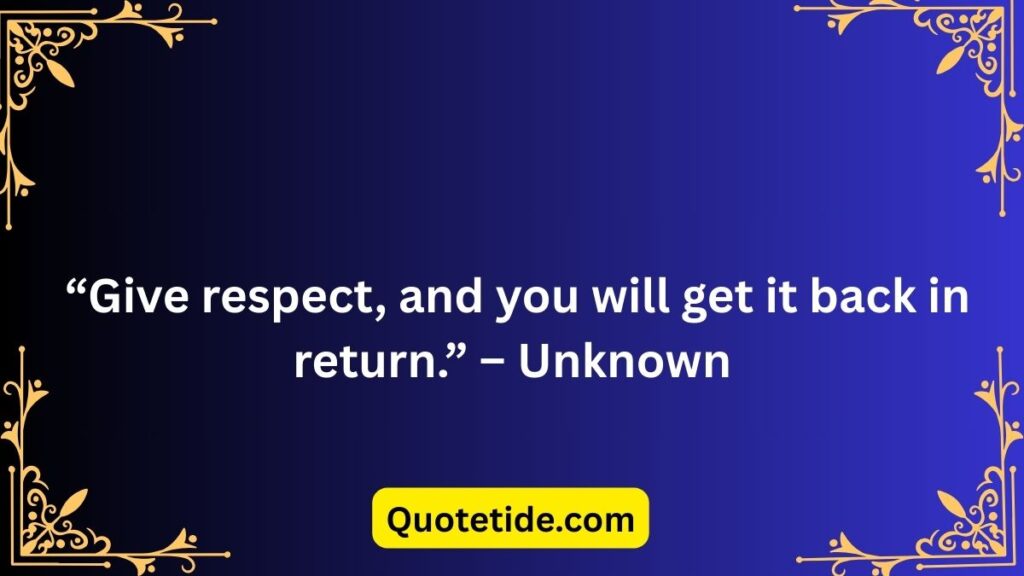
Affirmation:
“I give respect willingly, knowing that what I give to others will come back to me in unexpected and beautiful ways.”
This quote acts as a reminder of the law of reciprocity: that respect is a two-way street. When you give respect, you’re likely to receive it back in ways that deepen your relationships. This affirmation helps you trust the process and reminds you to always offer honor and consideration to others, regardless of their status or role.
10. “Respect begins with listening.” – Unknown
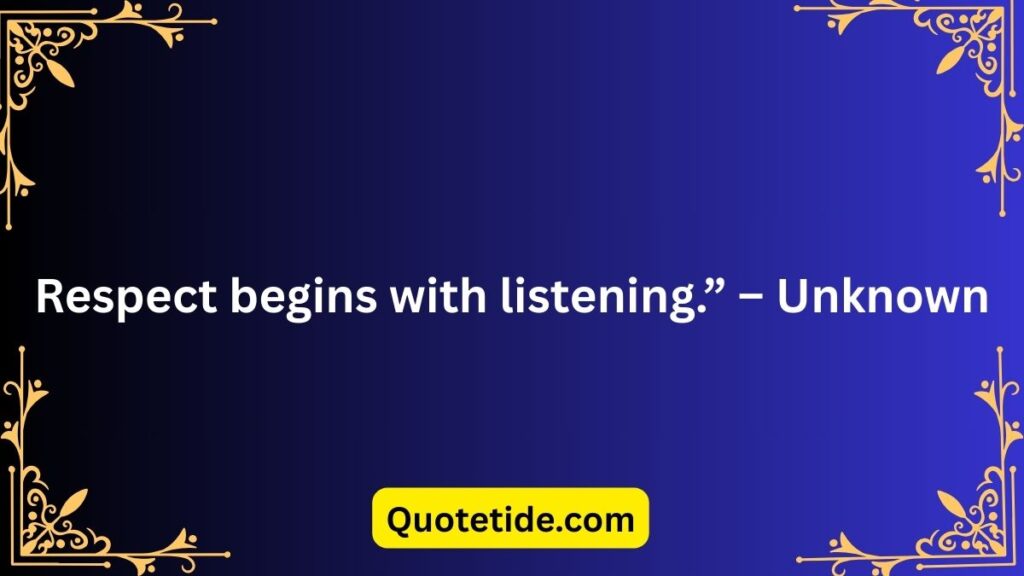
Affirmation:
“I practice active listening in every conversation. I honor the voices and perspectives of others by truly hearing what they have to say.”
This reminder emphasizes that true respect starts with listening. To respect others fully, you must first understand them. This affirmation encourages you to be fully present in conversations, creating space for others to express themselves without interruption or judgment.
11. “Respect is how to treat everyone, not just those you want to impress.” – Unknown
Affirmation:
“I treat everyone with respect, regardless of their status or what they can offer me. I believe everyone deserves kindness, dignity, and fairness.”
This affirmation reminds us that respect should be given freely to all people, not just those who can benefit us. It encourages you to practice respect without any conditions or expectations, fostering a spirit of equality and fairness in all relationships.
12. “When we treat people with respect, we build trust.” – Unknow
Affirmation:
“I build trust through my actions and words. By treating others with respect, I create deep and lasting connections.”
This quote is a great reminder that trust is the cornerstone of any successful relationship, and it is built through respectful actions. This affirmation strengthens your understanding of how important trust is for personal and professional growth, motivating you to consistently show respect in all of your interactions
How to Use These Affirmations Effectively
Incorporating these affirmations into your daily routine can significantly impact your personal growth and relationships. Here are a few tips on how to use them effectively:
- Start Your Day with Affirmations: Recite one or two affirmations every morning to set a positive tone for your day. Repeating them helps internalize their meaning and boosts your mindset.
- Write Them Down: Writing your affirmations in a journal or on sticky notes around your home or workspace can serve as constant reminders to practice respect in all areas of your life.
- Reflect on Them Throughout the Day: When faced with difficult situations or challenges, pause and reflect on these affirmations. Ask yourself how you can apply the principles of respect in your actions.
- Share with Others: Share these affirmations with friends, family, or colleagues. When you inspire others to practice respect, it creates a ripple effect that positively impacts everyone around you.
- Track Your Growth: Keep a journal of how practicing these affirmations impacts your relationships and personal growth. Look for patterns in how you feel and interact with others after consistently using them.
Respect Isn’t Just Earned—It’s Cultivated

Respect is often seen as something we earn over time—something that is given in response to our actions, words, and behavior. However, while earning respect is undoubtedly important, true respect is not just about earning it; it’s also about cultivating it through consistent, mindful actions and attitudes. Respect, in its most meaningful form, is a two-way street that requires both giving and receiving, practicing and nurturing.
In this article, we’ll explore the concept that respect is not just earned through good behavior or actions but is actively cultivated through daily interactions, self-awareness, and emotional intelligence. Cultivating respect goes beyond a transactional relationship; it’s about consistently creating an environment where respect thrives and grows over time.
What Does It Mean to Cultivate Respect?

To cultivate respect means to intentionally nurture it within yourself and in your relationships with others. Cultivating respect involves more than just showing respect when it’s convenient or when you expect something in return. It’s about creating mutual respect through positive actions, clear communication, and a deep understanding of boundaries and differences.
When we speak of cultivating respect, we’re talking about consistent efforts to create a positive environment where both individuals feel valued, understood, and heard. Whether in personal relationships, the workplace, or even with acquaintances, cultivating respect is a dynamic, ongoing process that fosters trust, honesty, and empathy.
How Respect Is Cultivated Through Action

Respect is not an abstract concept—it manifests itself through tangible actions and behaviors. When we show respect to others, it creates a ripple effect where people are more likely to mirror that respect in return. Cultivating respect takes deliberate action and involves various behaviors that reflect our regard for others and ourselves.
Here are several ways that respect is cultivated:
1. Active Listening:
One of the most important ways to cultivate respect is through active listening. When we truly listen to someone, we are showing that we value their thoughts, feelings, and perspectives. Active listening is not just about hearing words; it involves focusing on the speaker, understanding their message, and responding thoughtfully.
- How it cultivates respect: When people feel heard, they feel respected. Active listening creates a space for people to express themselves without judgment or interruption, fostering an environment of trust and mutual respect.
2. Empathy and Understanding:
Empathy is the ability to put yourself in someone else’s shoes and feel their emotions. Understanding their experience is essential in cultivating respect. It’s easy to respect someone when you agree with them, but true respect arises when you can understand and accept them even when their opinions or actions differ from your own. Respect to be espected quotes.
- How it cultivates respect: Empathy helps build stronger connections by recognizing that everyone’s experiences and feelings are valid, even if they differ from your own. This creates an environment where people feel accepted and appreciated, and respect flourishes.
3. Boundaries and Consent:
Respecting personal boundaries—whether physical, emotional, or psychological—is essential in cultivating mutual respect. Boundaries reflect individual autonomy, and honoring them is a way of demonstrating respect for others’ needs, desires, and limitations.
- How it cultivates respect: When we respect boundaries, we send a message that we value the other person’s comfort and autonomy. It creates an atmosphere of trust and ensures that both individuals feel safe and respected in the relationship.
4. Consistency in Behavior:
Respect isn’t a one-time gesture; it’s something that needs to be demonstrated consistently. This means showing respect not just in big moments but in everyday interactions. Whether you’re at work, at home, or in public, how you treat others consistently shapes how respect is perceived.
- How it cultivates respect: When people can count on you to treat them with dignity and fairness, respect becomes a cornerstone of the relationship. Predictable respect in behavior ensures that mutual trust is established and maintained.
5. Kindness and Courtesy:
Simple acts of kindness and courtesy can go a long way in cultivating respect. Whether it’s holding the door for someone, offering a compliment, or just acknowledging someone’s presence, these small but powerful actions communicate respect and consideration.
- How it cultivates respect: Small gestures of kindness show others that you acknowledge their worth and humanity. This helps to create a culture of respect where people feel valued and cared for.
6. Self-Respect and Personal Integrity:
Respect isn’t just about how we treat others; it also has a lot to do with how we treat ourselves. Self-respect means setting healthy boundaries, maintaining personal integrity, and knowing your own worth. When you respect yourself, it becomes easier to show respect to others.
- How it cultivates respect: Self-respect is the foundation upon which external respect is built. By demonstrating integrity and treating yourself with dignity, you set an example for others and encourage them to treat you with the same respect.
The Role of Communication in Cultivating Respect
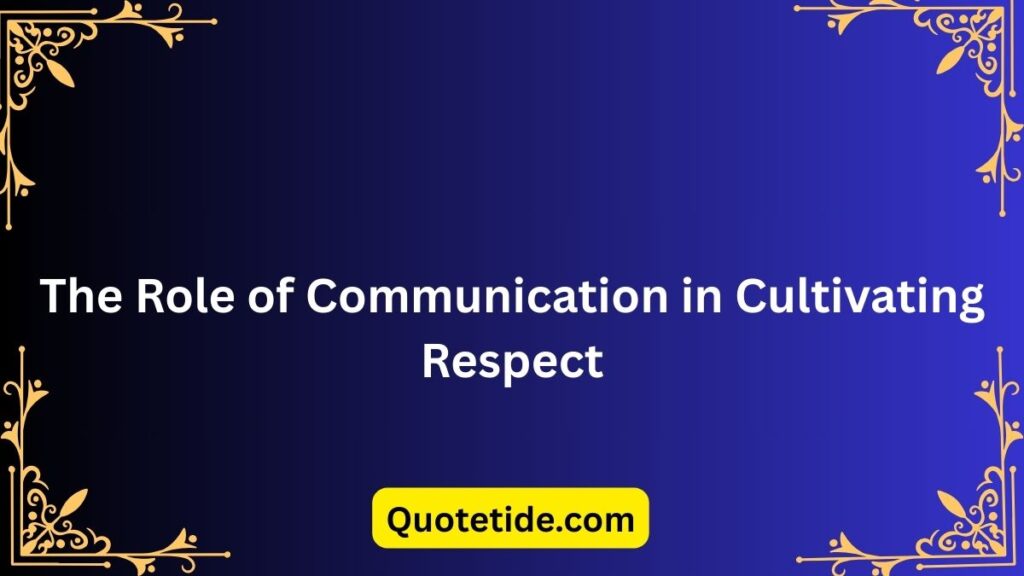
Clear and respectful communication plays a pivotal role in cultivating respect. How we communicate—whether through our words, body language, or tone—has a profound impact on how we are perceived and how others feel respected. Respect to be respected quotes Poor communication, on the other hand, can quickly break down trust and mutual respect.
1. Honest and Transparent Communication:
Being open and honest in communication fosters respect by ensuring that both parties are clear about their needs, expectations, and concerns. Transparency prevents misunderstandings and ensures that all parties feel valued and heard.
2. Non-Judgmental Language:
Using non-judgmental language is an important aspect of respectful communication. Avoiding criticism, sarcasm, or dismissiveness helps prevent conflicts and makes the other person feel safe enough to express themselves.
3. Acknowledging Differences:
Respecting differences—whether they relate to culture, beliefs, or perspectives—is crucial in cultivating respect. Acknowledging these differences with an open mind and a respectful attitude promotes inclusivity and understanding.
Respect and Leadership: Cultivating Respect in Teams
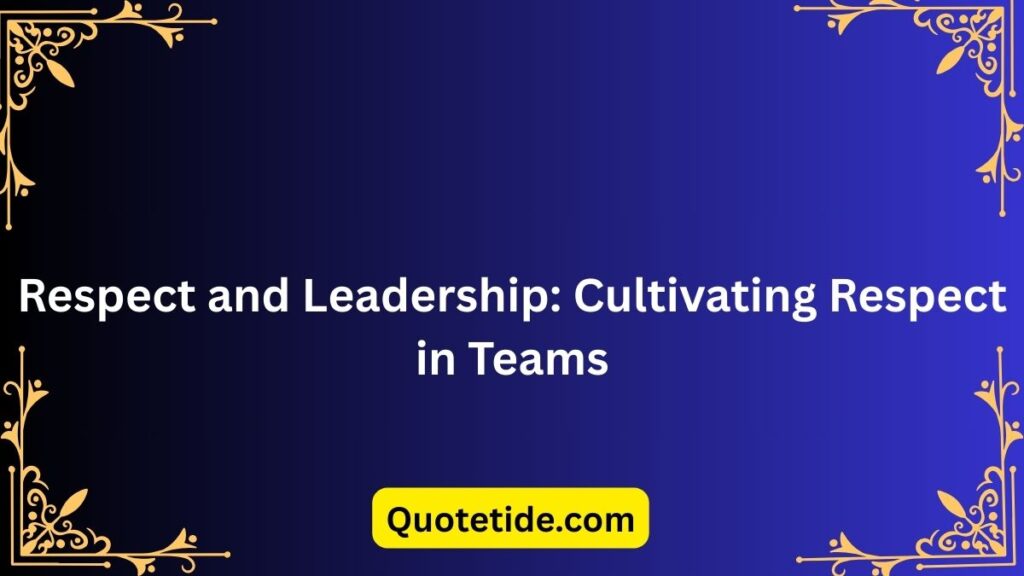
Is crucial in leadership and teamwork, where the collective success of a group depends on the level of respect shared among members. Respect to be respected . Leaders who cultivate respect within their teams foster trust, collaboration, and productivity.
1. Lead by Example:
Leaders who demonstrate respect for their team members through active listening, empathy, and clear communication set the tone for how others should interact. When respect is modeled from the top, it trickles down to every level of the organization.
2. Encourage Open Dialogue:
In a team environment, cultivating respect involves fostering an open dialogue where all members feel their input is valued. Encouraging feedback and creating a space for everyone to express themselves builds mutual respect among colleagues.
3. Promote Diversity and Inclusion:
Respecting the unique perspectives, skills, and backgrounds of team members is essential in cultivating a diverse and inclusive environment. Leaders who embrace diversity and foster inclusion create a culture of respect that allows everyone to thrive.
The Long-Term Impact of Cultivating Respect

Cultivating respect is not just about short-term gains—its long-term impact can create lasting, meaningful relationships. Here’s how cultivating respect benefits individuals, teams, and organizations:
- Stronger Relationships: By consistently showing respect in all interactions, you build deep, meaningful connections that are based on trust and mutual understanding.
- Increased Emotional Intelligence: Cultivating respect enhances emotional intelligence by fostering empathy, active listening, and conflict resolution skills.
- Personal Growth: Cultivating respect helps you grow as a person by encouraging you to develop qualities like patience, humility, and integrity.
- Enhanced Well-Being: Respectful environments contribute to better mental and emotional well-being. When respect is mutual, it creates a sense of safety, belonging, and self-worth.
- Improved Performance: In professional settings, respect fosters collaboration, open communication, and creativity. Teams that respect each other tend to be more effective and productive.
Conclusion:
In life, “Respect to Be Respected: Powerful Reminders for Everyday Life” teaches us that respect is more than just a one-time gesture. It’s about consistent actions, treating others with kindness, and listening with empathy. The more we cultivate respect, the stronger our relationships become. When we show respect, we create an environment where trust and understanding can flourish.
Respect is not only earned but also nurtured. “Respect to Be Respected: Powerful Reminders for Everyday Life” reminds us that mutual respect is a two-way street. By offering respect to others, we encourage them to do the same. Cultivating respect in every interaction leads to better connections, personal growth, and healthier relationships. In the end, respect is the foundation of all meaningful connections.
FAQs
1. What does “Respect to Be Respected: Powerful Reminders for Everyday Life” mean?
It means that respect is earned through actions and cultivated over time. Showing respect consistently encourages others to do the same.
2. How can I earn respect in my personal relationships?
You can earn respect by being kind, honest, and understanding. Listening actively and setting healthy boundaries also helps build respect.
3. Why is mutual respect important in the workplace?
Mutual respect fosters a positive work environment, improves collaboration, and boosts productivity. It helps build trust and strong professional relationships.
4. How does self-respect contribute to gaining respect from others?
When you respect yourself, you set boundaries and act with confidence, which encourages others to treat you with the same dignity and consideration.
5. Can respect be shown without agreeing with someone?
Yes, respect means acknowledging others’ opinions and treating them with dignity, even if you disagree. It’s about valuing their perspective.

Ashir Been is the owner and admin of QuoteTide, a platform dedicated to providing a rich collection of quotes, messages, and creative texts for various occasions. From motivational quotes to heartfelt wishes and flirty texts, Ashir ensures that QuoteTide remains a go-to destination for expressive and engaging content. With a passion for words and digital creativity, he curates high-quality content to help users effortlessly share their emotions and thoughts.
